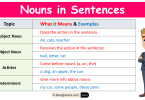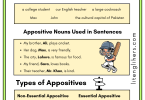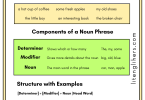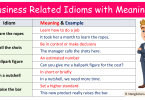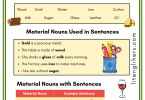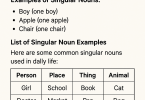Nouns do a lot of work in our sentences. They perform important work as subjects and objects. However, sometimes a noun needs a break or there isn’t a noun that fits the sentence perfectly. When nouns need a helping hand, who do they call? No, not ghostbusters that’s still a noun) – they use pronouns.
A pronoun can do all the jobs that nouns do, and many of them are shorter and more versatile. Pronouns allow us to say things like I’m proud of myself or It’s time to ask someone for help. Pronouns are a major part of speech and using them correctly will greatly improve your speaking and writing.
What is Pronoun?
Pro + Noun
Pro means “For” and Noun means “Name“.
“The word that is used in the place of the noun is called Pronoun.”
For Example:
He, she, it, they, we, you, who, him, them, whoever, anyone, something, nobody.
| Sentences | The pronoun used in the sentence |
| He has built a Cottage. | He |
| She goes to the Hospital daily. | She |
| They gonna try the snack. | They |
Pronouns are short words and can do everything that nouns can do and are also one of the building blocks of a sentence. To put it simply pronouns allow us to shorten sentences and make them sound less repetitive.
A pronoun can act as a :
- subject
- Direct object
- Indirect object
- Object of the preposition
They are also usually used to replace nouns and also sometimes stands for dubious adverbs, adjective, and other pronouns.
“The pronoun that can be replaced by a pronoun is called an antecedent.”
For instance “I love my tiger because he is a good boy”. In this sentence the word he is a pronoun that replaced the noun dog. Types of Pronouns:
Types of Pronouns:
There are many distant types of pronouns that we use in our writing and speech.
- Possessive pronouns
- Personal pronouns
- Relative pronouns
- Reflexive pronouns
- Indefinite pronouns
- Demonstrative pronouns
- Interrogative pronouns
- Intensive pronouns
- Reciprocal pronouns
Common types of pronouns:
1: Possessive pronouns:
“Possessive pronouns used to indicate a relationship of possession in a general sense.”
For Example:
mine, yours, his, ours, theirs.
- All of the cottages in our neighbourhood look the same, but ours is the only one with a solar plate.
- That string on the table is mine.
- That bottle on the shelf is mine.
They are also known as absolute or strong possessive pronouns.
- mine, yours, his, hers, ours, yours, theirs, its.
- I said that ring was mine.
Possessive adjectives are also known as weak possessive pronouns. They function as determiners in front of a noun just to describe the relation of a thing from whom that belongs.
For Example:
- my, your, his, her, its, our, your, their.
- I said that’s my bag.
2: Personal pronouns:
“The pronouns that are used to replace people, things, or places just to make sentences extensive and limpid clear.”
Examples of personal pronouns are:
I, you, she, he, it, they, me, us, them, we, you.
- I am afraid of the snake.
- The toaster gets torrid when it heats sweet breads.
- My panda’s are friendly so you can safely pet them.
They and Themselves are used as singular pronouns.
3: Relative pronouns:

“A word that is used to combine a dependent clause to an independent clause.”
The main purpose of the relative clause is to link a subordinate clause to the main clause. It refers to the noun mentioned before. It is called a “relative pronoun” because it relates to the word that its relative clause modifies.
| Dependent Clauses | Independent Clauses |
| Group of words that encompasses a subject and verb but doesn’t convey a complete thought. | It contains a subject, a verb but also expresses a complete thought. |
| ” While I go to the shopping mall”. | ” She wants to visit the white house”. |
Examples:
who, whom, which, that, what
- She doesn’t want to eat the cakes that are too soggy.
- This book, which ends on the fall of Satan, is really interesting.
- I need to find a person who can read Spanish.
4: Reflexive pronouns:
“when the subject and object of the verb mention the same person or thing, named as reflexive pronouns”.
For Instance:
Myself, itself, yourself, herself, himself, ourselves, themselves
- Alisa looked at herself in the office mirror.
- I like to cheer myself up with thrilling scenes.
- The clowns made fools of themselves.
5: Intensive pronouns:
“Pronouns that refer back to the subject of a sentence to put more emphasis on it known as intensive pronouns.”
They are identical to the Reflexive pronouns in appearance.
Intensive pronouns examples:
myself, yourself, ourselves, ourselves, ourselves, ourselves, etc.
- Oftentimes, the stress of being a part of this society is more asphyxiate than living here itself.
- The children made the juice themselves.
- I decorated my room myself.
6: Indefinite pronouns:
“A pronoun that doesn’t precisely determine what it is referring to.”
Who you are referring to?
Examples:
some, everybody, nothing, anywhere, anyone, somebody.
- This diary could have been written by anybody.
- Someone ate my pasta.
- The ink splashed everywhere.
7: Demonstrative pronouns:
“Pronoun that is used to point to specific people or things.”
Examples of demonstrative pronouns:
This, that, these, those.
- This is my best costume.
- That book on the table is very boring to read.
- I don’t know what that is, but it surely isn’t super friendly.
- I need you to fix these.
8: Interrogative pronouns:
“Interrogative pronouns are used to ask questions about unknown people or things.”
For Example:
who, whom, what, which, whose
- Who stole her dress?
- Who is an amphibian?
- Which one is the correct answer?
9: Reciprocal pronouns:
“The pronouns that express mutual relationships or actions are known as reciprocal pronouns.”
For Example:
each other, one another
- The members of the staff support one another.
- My mother and I love each other.
Singular or plural pronouns
1: Singular pronouns:
“Singular pronouns refer to an individual thing like singular nouns they also use singular verbs.”
Example:
I, she, he, it one, this, someone, something, anyone, nobody
- This is the best cake I have ever eaten.
- Somebody is standing next to the window.
2: Plural pronouns:
“Plural pronouns refer to multiple people or things and they must use as plural verbs.”
Plural nouns Examples:
we, they, them, ourselves, ourselves, those, these, many, several, others.
- We go to the gym every day.
- These books aren’t as old as those are.
- Several of the ducks know that children like to feed them bread.
Quiz Practice Test click on Test
Parts of speech and their Types in detail
- Noun Types
- Pronoun Types
- Adjective and its types
- Verb and its Types
- Adverb and its types
- Interjection and its types
- Conjunction and its Types
- Preposition and Its Types

